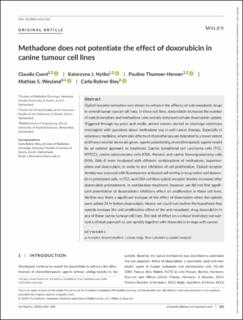Please use this identifier to cite or link to this item:
https://doi.org/10.21256/zhaw-25988Full metadata record
| DC Field | Value | Language |
|---|---|---|
| dc.contributor.author | Cueni, Claudia | - |
| dc.contributor.author | Nytko, Katarzyna J. | - |
| dc.contributor.author | Thumser-Henner, Pauline | - |
| dc.contributor.author | Weyland, Mathias S. | - |
| dc.contributor.author | Rohrer Bley, Carla | - |
| dc.date.accessioned | 2022-11-10T10:37:05Z | - |
| dc.date.available | 2022-11-10T10:37:05Z | - |
| dc.date.issued | 2020 | - |
| dc.identifier.issn | 2053-1095 | de_CH |
| dc.identifier.issn | 2053-1095 | de_CH |
| dc.identifier.uri | https://digitalcollection.zhaw.ch/handle/11475/25988 | - |
| dc.description.abstract | Opioid receptor activation was shown to enhance the efficacy of anti-neoplastic drugs in several human cancer cell lines. In these cell lines, doxorubicin increased the number of opioid receptors and methadone concurrently enhanced cellular doxorubicin uptake. Triggered through lay press and media, animal owners started to challenge veterinary oncologists with questions about methadone use in anti-cancer therapy. Especially in veterinary medicine, where side effects of chemotherapy are tolerated to a lesser extent and hence smaller doses are given, agents potentiating chemotherapeutic agents would be an optimal approach to treatment. Canine transitional cell carcinoma cells (TCC, K9TCC), canine osteosarcoma cells (OSA, Abrams) and canine hemangiosarcoma cells (HSA, DAL-4) were incubated with different combinations of methadone, buprenorphine and doxorubicin, in order to test inhibition of cell proliferation. Opioid receptor density was assessed with fluorescence-activated cell sorting in drug native and doxorubicin pretreated cells. In TCC and OSA cell lines opioid receptor density increased after doxorubicin pretreatment. In combination treatment, however, we did not find significant potentiation of doxorubicin's inhibitory effect on proliferation in these cell lines. Neither was there a significant increase of the effect of doxorubicin when the opioids were added 24 hr before doxorubicin. Hence, we could not confirm the hypothesis that opioids increase the anti-proliferative effect of the anti-neoplastic drug doxorubicin in any of these canine tumour cell lines. The lack of effect on a cellular level does not warrant a clinical approach to use opioids together with doxorubicin in dogs with cancer. | de_CH |
| dc.language.iso | en | de_CH |
| dc.publisher | Wiley | de_CH |
| dc.relation.ispartof | Veterinary Medicine and Science | de_CH |
| dc.rights | https://creativecommons.org/licenses/by/4.0/ | de_CH |
| dc.subject | Buprenorphine | de_CH |
| dc.subject | Cancer | de_CH |
| dc.subject | Dog | de_CH |
| dc.subject | Flow cytometry | de_CH |
| dc.subject | Opioid receptor | de_CH |
| dc.subject | µ-receptor | de_CH |
| dc.subject | Animal | de_CH |
| dc.subject | Antineoplastic agent | de_CH |
| dc.subject | Buprenorphine | de_CH |
| dc.subject | Cell line, tumor | de_CH |
| dc.subject | Cell proliferation | de_CH |
| dc.subject | Doxorubicin | de_CH |
| dc.subject | Methadone | de_CH |
| dc.subject.ddc | 630: Landwirtschaft | de_CH |
| dc.title | Methadone does not potentiate the effect of doxorubicin in canine tumour cell lines | de_CH |
| dc.type | Beitrag in wissenschaftlicher Zeitschrift | de_CH |
| dcterms.type | Text | de_CH |
| zhaw.departement | School of Engineering | de_CH |
| zhaw.organisationalunit | Institut für Angewandte Mathematik und Physik (IAMP) | de_CH |
| dc.identifier.doi | 10.1002/vms3.266 | de_CH |
| dc.identifier.doi | 10.21256/zhaw-25988 | - |
| dc.identifier.pmid | 32306524 | de_CH |
| zhaw.funding.eu | No | de_CH |
| zhaw.issue | 3 | de_CH |
| zhaw.originated.zhaw | Yes | de_CH |
| zhaw.pages.end | 289 | de_CH |
| zhaw.pages.start | 283 | de_CH |
| zhaw.publication.status | publishedVersion | de_CH |
| zhaw.volume | 6 | de_CH |
| zhaw.publication.review | Peer review (Publikation) | de_CH |
| zhaw.author.additional | No | de_CH |
| zhaw.display.portrait | Yes | de_CH |
| Appears in collections: | Publikationen School of Engineering | |
Files in This Item:
| File | Description | Size | Format | |
|---|---|---|---|---|
| 2020_Cueni-etal_Methadone-does-not-potentiate-the-effect-of-doxorubicin_Vet-Med-Sci.pdf | 589.89 kB | Adobe PDF |  View/Open |
Show simple item record
Cueni, C., Nytko, K. J., Thumser-Henner, P., Weyland, M. S., & Rohrer Bley, C. (2020). Methadone does not potentiate the effect of doxorubicin in canine tumour cell lines. Veterinary Medicine and Science, 6(3), 283–289. https://doi.org/10.1002/vms3.266
Cueni, C. et al. (2020) ‘Methadone does not potentiate the effect of doxorubicin in canine tumour cell lines’, Veterinary Medicine and Science, 6(3), pp. 283–289. Available at: https://doi.org/10.1002/vms3.266.
C. Cueni, K. J. Nytko, P. Thumser-Henner, M. S. Weyland, and C. Rohrer Bley, “Methadone does not potentiate the effect of doxorubicin in canine tumour cell lines,” Veterinary Medicine and Science, vol. 6, no. 3, pp. 283–289, 2020, doi: 10.1002/vms3.266.
CUENI, Claudia, Katarzyna J. NYTKO, Pauline THUMSER-HENNER, Mathias S. WEYLAND und Carla ROHRER BLEY, 2020. Methadone does not potentiate the effect of doxorubicin in canine tumour cell lines. Veterinary Medicine and Science. 2020. Bd. 6, Nr. 3, S. 283–289. DOI 10.1002/vms3.266
Cueni, Claudia, Katarzyna J. Nytko, Pauline Thumser-Henner, Mathias S. Weyland, and Carla Rohrer Bley. 2020. “Methadone Does Not Potentiate the Effect of Doxorubicin in Canine Tumour Cell Lines.” Veterinary Medicine and Science 6 (3): 283–89. https://doi.org/10.1002/vms3.266.
Cueni, Claudia, et al. “Methadone Does Not Potentiate the Effect of Doxorubicin in Canine Tumour Cell Lines.” Veterinary Medicine and Science, vol. 6, no. 3, 2020, pp. 283–89, https://doi.org/10.1002/vms3.266.
Items in DSpace are protected by copyright, with all rights reserved, unless otherwise indicated.